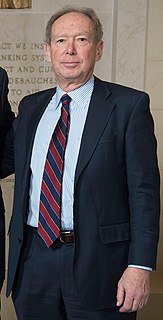A Quote by Gary H. Stern
RE: GSEs like Freddie Mac & Fannie Mae: "creditors will continue to underprice the risk-taking of these financial institutions, overfund them, and fail to provide effective market discipline Facing prices that are too low, systemically important firms will take on too much risk."
Related Quotes
Fannie Mae and Freddie Mac - two bloated and corrupt government-sponsored programs - contributed heavily to the crisis.In order to prevent another crisis, we need to do what we should have done years ago - reform Fannie Mae and Freddie Mac. We also need to repeal Dodd-Frank, the Democrats' failed solution. Under Dodd-Frank, 10 banks too big to fail have become five banks too big to fail. Thousands of community banks have gone out of business.
There is plenty of blame to go around for the U.S. housing bubble, but not much of it belongs to Fannie Mae and Freddie Mac. The two giant housing-finance institutions made many mistakes over the decades, some of them real whoppers, but causing house prices to soar and then crater during the past decade weren't among them.
These public-private partnerships are very, very dangerous. The most rotten part of the financial system in the US consisted of the government sponsored entities, Fannie Mae and Freddie Mac. They really kicked off this crisis. The state should set the rules and enforce them - but not become involved as a market player.




































